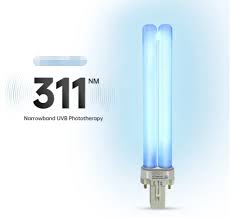
Narrowband Light Therapy Uses: How It Helps Manage Psoriasis and Eczema Naturally
Share
Understanding Narrowband Light Therapy
Narrowband light therapy is one of the most trusted, dermatologist-recommended treatments for chronic skin conditions such as psoriasis, eczema, and vitiligo. It uses a very specific wavelength of ultraviolet B (UVB) light — 311 to 313 nanometres — which has been shown to slow down excessive skin cell growth, reduce inflammation, and calm itching.
Unlike older broadband phototherapy methods, narrowband UVB light targets only the most effective part of the UV spectrum, minimising side effects and making treatments more comfortable for regular use.
At Australian Psoriasis and Eczema Supplies, we specialise in narrowband light therapy devices designed for safe, convenient, and at-home treatment. From desktop UVB lamps to handheld phototherapy wands, our range provides options for targeted or full-body treatment, without the need for constant clinic visits.
How Narrowband Light Therapy Works
When UVB 311nm light penetrates the skin, it slows the overproduction of skin cells — the main cause of psoriasis plaques and eczema flare-ups. It also reduces the activity of overactive immune cells, helping the skin return to its natural state.
Benefits include:
-
Reduced redness, scaling, and itching
-
Fewer flare-ups over time
-
Drug-free and steroid-free treatment option
-
Safe for long-term use under correct guidance
Because narrowband light therapy uses a targeted wavelength, it allows for shorter session times compared to older phototherapy methods. This means less skin exposure and fewer potential side effects.
Main Narrowband Light Therapy Uses
1. Psoriasis Management
Psoriasis is an autoimmune condition where skin cells multiply too quickly, creating thick, scaly patches. Narrowband UVB therapy is one of the most effective non-drug treatments for psoriasis, often showing visible improvement within 4–6 weeks of regular use.
At Australian Psoriasis and Eczema Supplies, we offer devices like the Desktop UVB 311nm Light Therapy Lamp, perfect for treating large areas such as the back, arms, and legs. For scalp psoriasis, our Handheld UVB Light Therapy Comb allows light to penetrate through hair for direct treatment to the scalp.
2. Eczema Relief
Eczema, or atopic dermatitis, causes itchy, inflamed skin that can be triggered by environmental factors, allergens, or stress. Narrowband UVB light helps reduce inflammation, strengthen the skin barrier, and relieve persistent itching.
Many customers with long-term eczema have found that using our Portable Handheld UVB Light Therapy Device provides targeted relief without the side effects of topical steroids.
3. Vitiligo Treatment
Vitiligo occurs when pigment-producing cells (melanocytes) are damaged or destroyed, causing white patches to form on the skin. Narrowband UVB therapy can stimulate melanocytes, encouraging pigment to return over time.
Our UVB Light Therapy Units can be used to treat localised patches or larger affected areas, depending on your needs.
4. Scalp Conditions
Conditions like scalp psoriasis and seborrheic dermatitis can be difficult to treat with creams or ointments. Narrowband UVB comb devices allow light to pass through hair and directly treat the skin underneath. The Handheld UVB Light Therapy Comb available on our website is specifically designed for this purpose.
5. General Skin Inflammation
Beyond chronic conditions, narrowband UVB light can be used to calm stubborn skin inflammation caused by immune responses. While it’s always important to get medical advice before starting treatment, many people have found it useful for rare inflammatory skin disorders when other treatments fail.
Why Choose Narrowband UVB Over Other Light Therapies
There are several types of phototherapy, but narrowband light therapy uses a wavelength proven to be both safe and effective for long-term skin health. Compared to broadband UVB or PUVA therapy:
-
More targeted – Uses only the therapeutic range (311–313nm)
-
Fewer side effects – Less risk of burning or premature skin ageing
-
Shorter treatment times – Sessions can be as little as 2–10 minutes
-
Suitable for home use – With the right device and guidance, you can avoid frequent clinic visits
How to Use Narrowband Light Therapy at Home
When using devices like the Desktop UVB Lamp or Handheld UVB Wand from our store, follow these steps for safe, effective treatment:
-
Start with short sessions – Usually a few seconds to a couple of minutes, depending on skin type.
-
Treat affected areas only – Avoid unnecessary exposure to unaffected skin.
-
Protect eyes – Always wear UV-blocking goggles provided with your device.
-
Increase gradually – Slowly extend treatment times as directed.
-
Stay consistent – Regular use delivers the best results, typically 3–5 times a week.
Safety and Precautions
While narrowband UVB therapy is considered safe, it’s important to follow usage guidelines. Possible mild side effects include redness or temporary tanning. Always:
-
Follow manufacturer instructions
-
Avoid overexposure
-
Consult your healthcare provider if you have a history of skin cancer or light-sensitive conditions
Our Narrowband Light Therapy Products
At Australian Psoriasis and Eczema Supplies, we stock a range of narrowband UVB devices to suit different needs:
-
Desktop UVB 311nm Light Therapy Lamp – Ideal for larger body areas
-
Portable Handheld UVB Light Therapy Device – Great for smaller patches
-
UVB Light Therapy Comb – Designed for scalp and targeted areas
Each device is designed for home use with clear instructions, safety goggles, and after-sales support.
Final Thoughts
When it comes to chronic skin conditions like psoriasis, eczema, and vitiligo, narrowband light therapy uses are backed by years of research and thousands of success stories. With the right device, you can enjoy professional-level treatment at home, save time on clinic visits, and manage your skin naturally without relying solely on medication.
If you’re ready to explore the benefits of narrowband UVB treatment, browse our full range of light therapy devices today.
